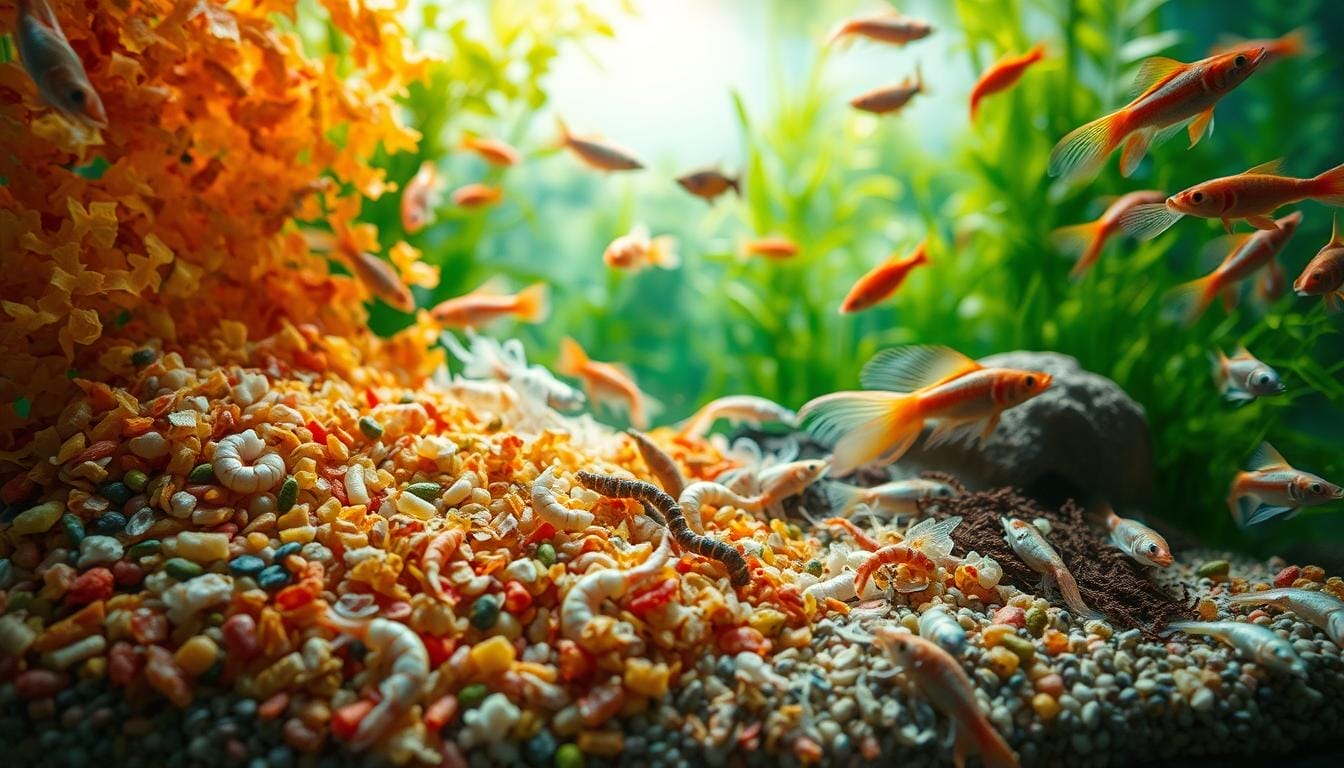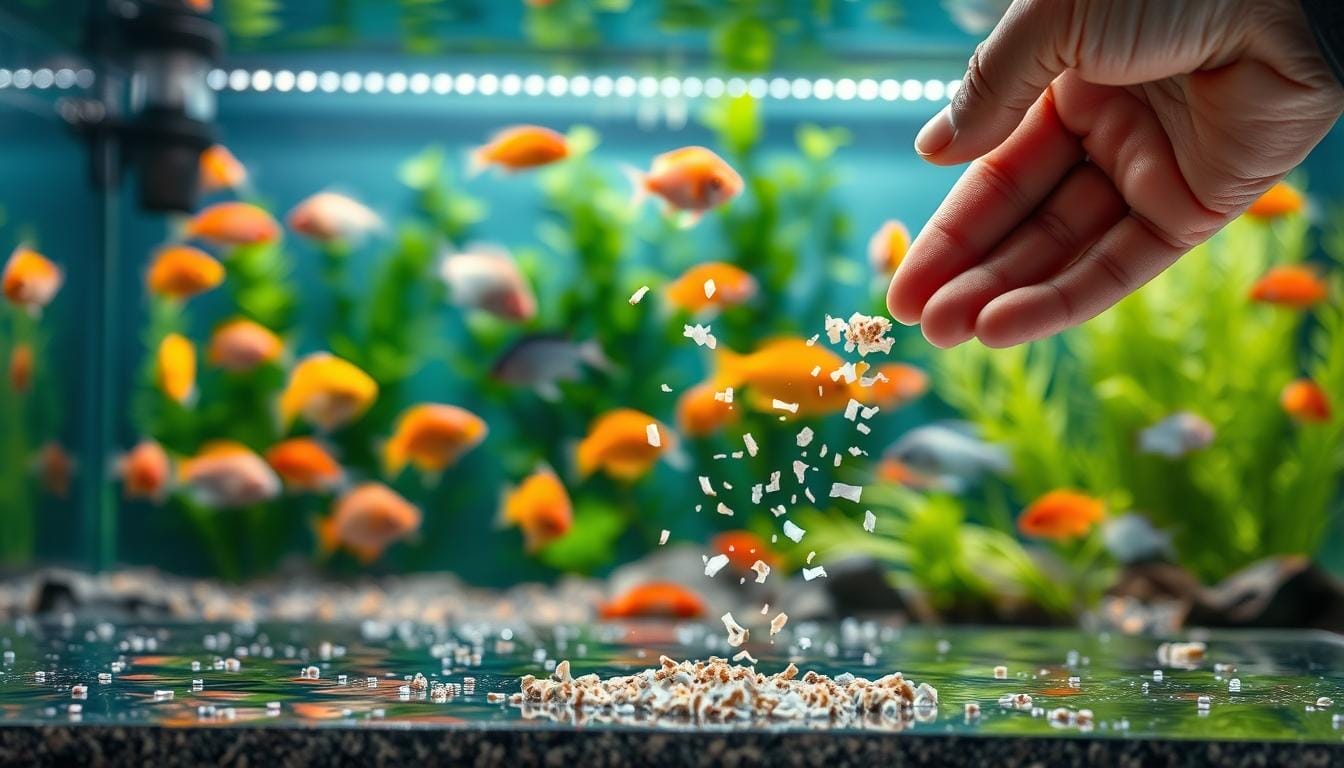
Your Feeding Vacation Tips Guide for a Stress-Free Aquarium

Did you know over 60% of aquarium owners delay travel plans due to concerns about their fish’s well-being? Your underwater family relies on consistent care, and leaving them behind can feel like abandoning a delicate ecosystem. But here’s the secret: creating a self-sustaining routine for your tank is simpler than you think.
Whether you’re away for three days or three weeks, modern solutions let you maintain pristine water quality and nutrition. Automatic feeders now mimic natural portion sizes, while timed lighting systems keep your aquatic environment stable. Even reef tanks with sensitive coral can flourish with the right preparation.
We’ll walk you through setting up a fail-safe plan that works for your specific setup. From choosing the perfect feeding formula dispenser to safeguarding against equipment failures, these methods have been tested by thousands of hobbyists. You’ll learn how to:
• Balance food distribution for different fish species
• Prevent common travel-related water chemistry issues
• Create backup systems that protect your home ecosystem
Your dedication to responsible pet care shines through in every bubble and fin flicker. With our guidance, you’ll return to a vibrant tank – and maybe even happier fish!
Understanding the Essentials of Feeding Vacation Tips
Your aquarium thrives on predictability – its rhythm as steady as the gentle flow of a filter. Creating a reliable care plan ensures your aquatic friends maintain their health and vibrancy while you’re away. Let’s explore how to build a system that works like clockwork.
Why Preparation Makes All the Difference
Fish depend on consistent routines more than many realize. A single missed meal can stress certain species, while overfeeding clouds water quality. Automatic dispensers solve this by delivering precise amounts of specialized formula at set times – perfect for maintaining ideal nutrition.
Consider these factors when planning:
- Species-specific dietary needs (herbivores vs carnivores)
- Your trip’s duration (3 days vs 3 weeks)
- Backup solutions for power outages
Smart Flexibility in Daily Care
While routines matter, life sometimes surprises us. Choose equipment that allows adjustments – maybe a feeder that lets caretakers supplement with fresh food. Test your system thoroughly before departure day.
Pro tip: Label portion bottles with dates and amounts. This prevents double-feeding and helps anyone assisting. Your preparation today becomes tomorrow’s peace of mind, letting you focus on travel adventures rather than worrying about home.
Packing and Preparing Your Feeding Supplies
Imagine returning from your trip to find your aquarium thriving – every fish darting eagerly as if you never left. Achieving this starts with strategic preparation of your aquatic care toolkit. Let’s explore how to assemble supplies that keep your ecosystem stable while you’re away.
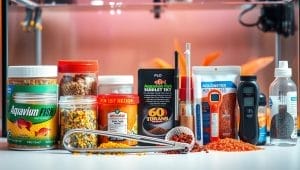
Choosing the Right Formula, Bottles, and Dispensers
Your fish’s nutritional needs demand precision. Select a slow-release formula designed for extended trips, which dissolves gradually to prevent water contamination. For timed feedings, portion-control bottles let you customize amounts by species – herbivores might need algae wafers daily, while carnivores thrive on pellet schedules.
Consider these essentials:
- Sealed containers to protect food from humidity
- Dispensers with adjustable portion sizes
- Backup batteries for automatic systems
Tips for Organizing Your Gear Efficiently
Label everything. Use waterproof tags to mark bottles with dates and feeding times – “Tuesday AM: 1/2 scoop for tetras” removes guesswork. Store supplies in a dedicated box near the tank, including:
- Extra filter cartridges
- Water test strips for quick checks
- Emergency contact numbers
Place a checklist on the lid detailing daily tasks. This helps anyone assisting maintain your careful balance. One pro tip? Do a trial run with your system 3 days before departure to catch issues early.
feeding vacation tips: Managing Formula and Breast Milk On-The-Go
Preparing your aquarium for travel mirrors the care you’d take with precious cargo – every detail matters. By organizing supplies like a seasoned explorer, you’ll maintain your tank’s rhythm even while away.
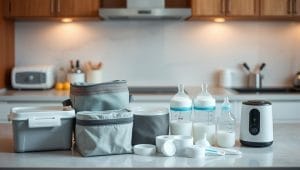
Portion Control Made Simple
Think of fish food portions as tiny lifelines – precise and vital. Use sealed bags or small containers labeled with days and times. This system:
- Prevents overfeeding disasters
- Accounts for different dietary needs
- Works for automatic dispensers or helpers
Choose slow-dissolve formulas that mimic natural feeding patterns. Test portions beforehand to perfect the balance between nutrition and water clarity.
Preparing for the Unexpected
Airport-level security checks apply to your setup too. Before departure:
- Double-seal food containers against humidity
- Pack backup portions in separate bags
- Include water test strips for quick diagnostics
Place instructions near the tank using clear icons or color codes. This visual guide helps anyone assist without questions – like having a flight manual for your aquatic crew.
Strategies for Stress-Free Travel with Baby
Your fish deserve the same thoughtful planning you’d give cherished family members when life takes you away. A calm aquarium begins with predictable rhythms – water parameters, light cycles, and meal schedules that mirror their home routine.
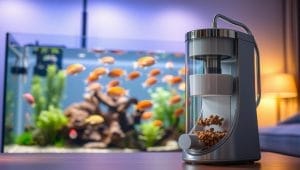
Building Confidence Through Preparation
Automatic feeders become your greatest ally, dispensing formula with clockwork precision. Test your system for 3 days before departure to catch quirks like jammed dispensers or uneven portion sizes. This trial run helps your fish adjust to new equipment while you refine timing.
Three essentials for success:
- Label bottles with dates and portion sizes
- Store backup formula in airtight containers
- Include water test strips for quick quality checks
Create a visual guide near the tank using color-coded charts. Green for normal feeding times, yellow for emergency protocols. This lets helpers act decisively if questions arise about behavior changes or clouded water.
Remember: consistency reduces stress. If your cichlids normally eat at 9 AM and 5 PM, keep that schedule during your trip. Timed lights and filters maintain their natural day/night cycle too – crucial for species sensitive to environmental shifts.
Caring for Feeding Gear During and After Travel
A sparkling tank begins with spotless tools. Your equipment’s cleanliness directly impacts water quality and fish health – especially when relying on automatic systems. Let’s create a maintenance routine that keeps your setup reliable before, during, and after trips.
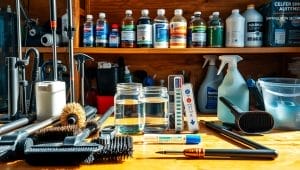
Cleaning Supplies and Hygiene Best Practices
Disinfect scoops and dispensers weekly using hot water and mild dish soap. Scrub crevices with a bottle brush to remove trapped food particles. Always rinse thoroughly – leftover soap creates toxic bubbles in water.
Three essentials for travel prep:
- Air-dry equipment completely to prevent mold
- Store formula in airtight bags at room temperature
- Label containers with expiration dates
Setting Up a Travel-Friendly Feeding Station
Designate one shelf or drawer near the tank for all care items. Use clear bins to organize:
- Pre-portioned food packets labeled by day
- Backup batteries for automatic feeders
- Emergency contact numbers and instructions
Test your station for a week before departure. This trial run helps identify missing items or confusing layouts. Return home to immediate gear inspection – check for clogs in dispensers or worn seals on containers. Your vigilance ensures every journey ends with healthy, happy fish.
Maintaining Baby’s Feeding Routine on the Road
Your aquarium’s heartbeat shouldn’t falter while you’re exploring new horizons. Like syncing watches before a mission, aligning your care routine with travel plans keeps your aquatic family thriving. Modern tools let you preserve normalcy – even when crossing time zones or managing extended road trips.
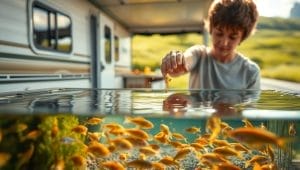
Syncing Schedules Across Distances
Automatic feeders with time-adjustment features solve time zone challenges. If traveling east, program meals 3 hours earlier. Heading west? Delay feedings gradually over 2 days pre-trip. This eases your fish into schedule shifts without digestive stress.
Three essentials for clockwork care:
- Battery backups for power fluctuations
- Sealed formula containers to block humidity
- Digital timers synced to your home’s daylight cycle
Smooth Transitions for Sensitive Species
Angelfish and tetras thrive on predictability. Use these strategies during changes:
- Keep room temperature stable with a backup heater
- Maintain water flow patterns with pre-set pumps
- Limit tank access to reduce stress triggers
Pack a travel-ready emergency kit with test strips, extra filter media, and bottled bacteria. Share detailed instructions with caretakers – include photos of normal behavior versus stress signs. Your preparation ensures every finned family member stays content until you return.
Wrapping Up Your Stress-Free Feeding Vacation Experience
You’ve mastered the art of aquatic caregiving—now adventure awaits with confidence. Your careful preparation ensures your tank remains a thriving ecosystem, even while you explore new horizons. Those automatic dispensers and labeled supplies? They’re your silent partners in maintaining perfect water quality and happy fish.
Remember: success lies in simplicity. Tested systems prevent surprises, while clear instructions empower helpers. Return to darting fins and crystal-clear water—proof your methods work. This isn’t just about survival; it’s about creating stability that mirrors nature’s rhythms.
Every trip sharpens your skills. What feels like meticulous planning today becomes second nature tomorrow. Your dedication transforms potential stress into effortless flow, letting you savor both travel and homecoming. The real victory? Knowing your aquatic family thrives because you chose smart preparation over worry.
Go ahead—book that getaway. Your tank’s ready, and so are you.
FAQ
How do I keep formula fresh during long road trips?
Use insulated bottle bags with ice packs for pre-mixed formula, and store powdered formula in airtight containers. Pre-measure servings in portable dispensers like Philips Avent or Dr. Brown’s to mix with bottled water as needed.
Can I bring breast milk through airport security?
Yes! TSA allows breast milk in quantities greater than 3.4 ounces. Inform agents before screening, and use cooler bags with ice packs. Ready-to-feed options like Similac Travelers simplify airport transitions.
What’s the best way to clean bottles on-the-go?
Pack a collapsible drying rack, travel-sized dish soap, and a portable bottle brush. For quick sanitizing, use Medela Quick Clean Wipes or microwave steam bags compatible with most hotel microwaves.
How do I handle time zone changes with feedings?
Gradually adjust meal times 15–20 minutes daily before your trip. During travel, follow baby’s hunger cues but gently nudge schedules using natural light exposure to reset their internal clock.
Are there compact bottle warmers for flights?
Try the Baby’s Brew Portable Warmer, which heats bottles to precise temperatures. Flight attendants can often provide hot water—just test it on your wrist before warming formula to avoid hotspots.
What gear prevents spills in a moving car?
Use spill-proof bottles like Munchkin LATCH and secure them in cup holders. For messy moments, keep a car organizer stocked with burp cloths, disposable bibs, and a handheld vacuum for quick cleanups.





